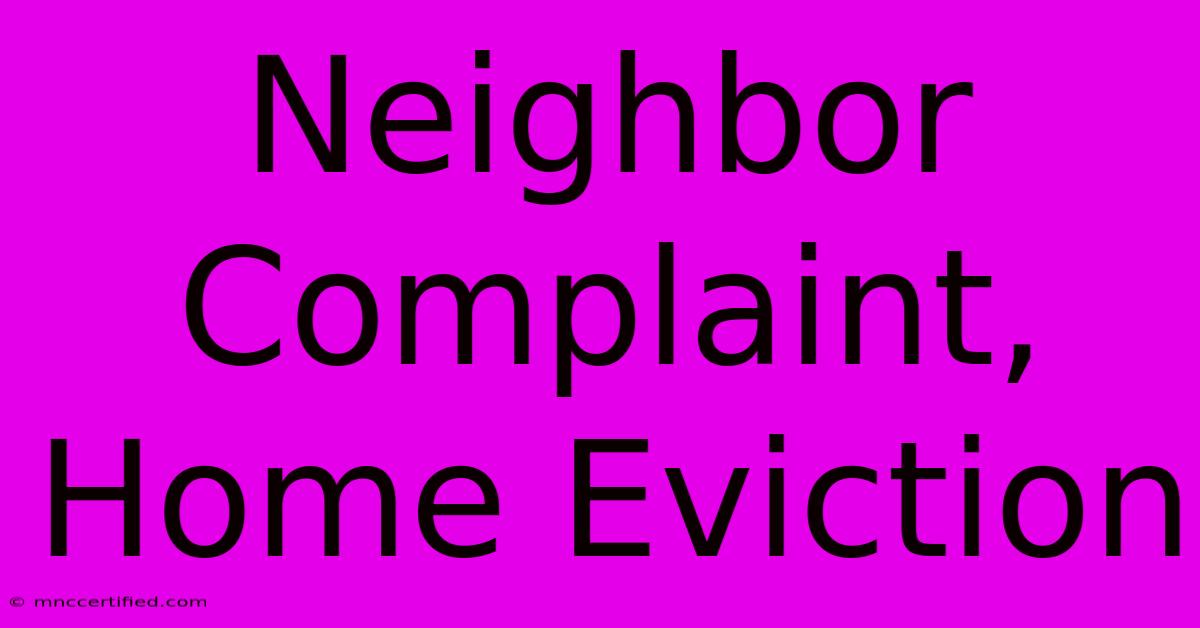Neighbor Complaint, Home Eviction

Table of Contents
Neighbor Complaint: Understanding the Potential for Home Eviction
Facing a neighbor complaint can be a stressful experience, especially when it threatens your home. This article explores the potential link between neighbor complaints and home eviction, outlining the process and offering advice on how to navigate this challenging situation.
Understanding the Connection: Neighbor Complaints and Eviction
While a single neighbor complaint rarely leads directly to eviction, repeated or serious complaints can significantly increase your risk. Landlords have a legal obligation to provide a safe and peaceful living environment for all tenants. Persistent disruptions caused by your actions, as reported by neighbors, can be grounds for eviction. The severity of the complaint and your landlord's policies will play crucial roles in determining the outcome.
Types of Neighbor Complaints Leading to Eviction
Several types of neighbor complaints can escalate to eviction proceedings:
- Noise Complaints: Excessive noise, late-night parties, or constant disturbances are common causes of conflict. Repeated violations of noise ordinances can lead to legal action from your landlord.
- Damage to Shared Property: Damaging communal areas, such as hallways or gardens, can trigger complaints and potential eviction.
- Illegal Activities: Engaging in illegal activities on your property, such as drug manufacturing or dealing, almost certainly results in immediate eviction.
- Disruptive Behavior: Harassment, threats, or other aggressive behavior towards neighbors is a serious offense and can lead to eviction.
- Violation of Lease Agreement: Breaching your lease agreement, such as exceeding the permitted number of occupants or keeping prohibited pets, also puts you at risk of eviction.
Navigating a Neighbor Complaint: Steps to Take
If you receive a complaint from a neighbor, take immediate action to address the issue:
- Communicate Directly: Attempt to resolve the issue amicably with your neighbor. Understanding their concerns can be crucial in finding a solution.
- Document Everything: Keep records of all communications, including dates, times, and the substance of conversations. This documentation is vital if the issue escalates.
- Cooperate with Your Landlord: Be proactive and inform your landlord of the complaint. Provide your side of the story and offer solutions to prevent future problems.
- Follow Your Lease Agreement: Review your lease agreement to understand your responsibilities and the consequences of violating its terms.
- Seek Legal Advice: If the situation worsens or you receive an eviction notice, consult with a lawyer specializing in tenant rights.
Preventing Future Complaints: Proactive Measures
Taking proactive steps can significantly reduce the chances of future neighbor complaints:
- Be Mindful of Noise Levels: Respect quiet hours and be considerate of your neighbors' peace and quiet.
- Maintain Your Property: Keep your property clean and well-maintained to avoid causing issues for others.
- Communicate Respectfully: Establish respectful communication with your neighbors from the start.
- Follow Building Rules: Adhere to all building rules and regulations.
Eviction Proceedings: Understanding Your Rights
If your landlord initiates eviction proceedings, understand your rights. You have the right to:
- Due Process: The landlord must follow legal procedures, including providing proper notice.
- Legal Representation: You can seek legal counsel to defend your rights.
- Appeal: You may have the right to appeal an eviction order.
Remember: Each situation is unique, and the severity of the neighbor complaint, along with local laws and your lease agreement, will significantly impact the outcome.
Keywords: neighbor complaint, home eviction, landlord, tenant rights, lease agreement, noise complaint, eviction notice, legal advice, due process, dispute resolution, property damage, disruptive behavior, legal action.
This article aims to provide general information and should not be considered legal advice. For specific legal advice, consult with a qualified attorney.

Thank you for visiting our website wich cover about Neighbor Complaint, Home Eviction. We hope the information provided has been useful to you. Feel free to contact us if you have any questions or need further assistance. See you next time and dont miss to bookmark.
Featured Posts
-
Security Incident At Dublin Airport Update
Nov 18, 2024
-
Mc Ilroy Wins Dp World Tour Finale
Nov 18, 2024
-
I M A Celeb 2024 Dean Mc Cullough
Nov 18, 2024
-
Good Bad Ugly Packers Win Breakdown
Nov 18, 2024
-
Peter Kay Belfast New Date Announced
Nov 18, 2024